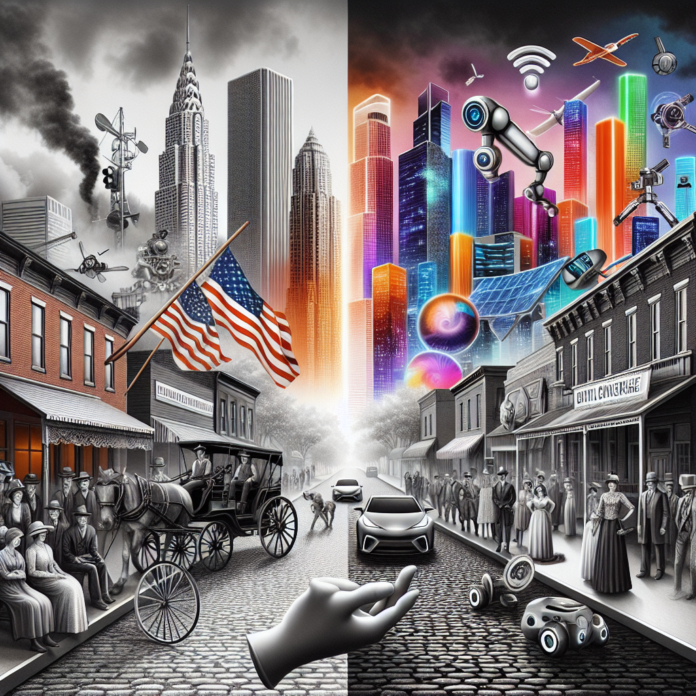The Trouble with Traditionalism in Contemporary America
In contemporary American society, the clash between traditionalism and progressive values manifests in multifaceted ways, stirring debates that reverberate through the nation’s cultural, political, and religious arenas. While traditionalism anchors itself in the preservation of long-established customs, suggesting a rootedness and sense of stability, it also often poses significant obstacles to social progress and inclusivity. This tension is particularly palpable in American religious communities, where the struggle to reconcile age-old practices with modern realities epitomizes the complexities and contradictions inherent in traditionalist ideology.
Traditionalism, by its nature, is resistant to change, often preferring to maintain established norms rather than adapt to new circumstances. In the United States, this has often translated into the preservation of societal structures that are not conducive to the advancement of marginalized groups. Historically, traditionalist values have been used to justify segregation, gender discrimination, and the suppression of LGBTQ rights. For instance, during the Civil Rights Movement, Southern traditionalists frequently cited longstanding social norms to defend racial segregation. In doing so, traditionalism failed to recognize the moral imperative of equality, demonstrating a disconnect between established practices and evolving ethical standards.
Religious traditionalism, particularly within the Catholic Church, highlights another layer of complexity. In recent years, Pope Francis has advocated for more progressive stances, calling for compassion and inclusivity in matters of divorce, LGBTQ rights, and the role of women in the church. His approach reflects a departure from strict adherence to traditional interpretations of doctrine, opening a dialogue for reform that acknowledges the dynamic nature of contemporary ethical concerns. However, this has not been without resistance. Catholic conservatism, closely tied to the Latin Mass culture, often presents a formidable opposition to such changes, advocating for the preservation of historical liturgical practices and more rigid doctrinal interpretations.
The resurgence of the Latin Mass among some Catholic groups is emblematic of this traditionalist push. While its aesthetic appeal and historical reverence attract a dedicated following, it can also symbolize a reluctance to engage with broader societal shifts and the diverse realities of modern congregations. Critics argue that an overemphasis on traditional liturgy can alienate potential followers who may feel marginalized by the church’s resistance to progressive reform. Moreover, this adherence to the Latin Mass often reflects a broader ideological stance that can overshadow the church’s mission to promote inclusivity and understanding in a rapidly changing world.
The risks of traditionalism extend beyond the confines of religious practice into the realm of politics and socio-cultural dynamics. In recent years, political traditionalism has become a rallying point for some factions, who view progressive policies as a threat to the status quo. This is particularly evident in debates over climate change, healthcare, and education reform, where opposition is frequently cloaked in the language of preserving American values or protecting individual freedoms. These arguments can obfuscate the pressing need for innovative solutions to contemporary challenges, ultimately hindering societal progress.
Furthermore, traditionalist rhetoric often appeals to a nostalgic idealization of a perceived "golden age," ignoring the complex realities and inequalities that characterized past eras. Such rhetoric not only perpetuates myths about the efficacy of earlier societal structures but also fosters a resistance to addressing historical injustices. The romanticization of the past can detract from efforts to create a more equitable future, one that acknowledges and rectifies the systemic disparities ingrained in traditional norms.
From a broader perspective, the resistance to progressive change inherent in traditionalism can undermine social cohesion, as it incentivizes exclusionary practices over inclusivity and empathy. By holding steadfastly to the "way things have always been done," traditionalism risks alienating those who do not conform to historical archetypes, stifling innovation and progress in the process.
In contrast, progressive values promote adaptability, inclusivity, and respect for diversity, encouraging societies to evolve in response to contemporary needs and challenges. Progressivism champions the notion that social structures should reflect and serve the diversity of experiences and identities that comprise modern America. By advocating for policies and practices that emphasize equity and empathy, progressivism seeks not to deny history, but to learn from it, applying its lessons to foster a more just and inclusive future.
As America continues to grapple with the tensions between traditionalism and progressivism, it becomes increasingly clear that the future of societal development depends on embracing change and championing innovation. While the comfort of tradition offers a sense of security, it is only by engaging with the complex realities of the present that meaningful and lasting progress can be achieved.
Ultimately, the challenge is not to erase tradition but to reinterpret it in ways that are inclusive, equitable, and relevant to contemporary society. As Pope Francis has exemplified, the path forward lies in the delicate balance of respecting historical foundations while being open to transformative change. In doing so, America can create a narrative not bound by the limitations of the past, but propelled by the possibilities of the future.
